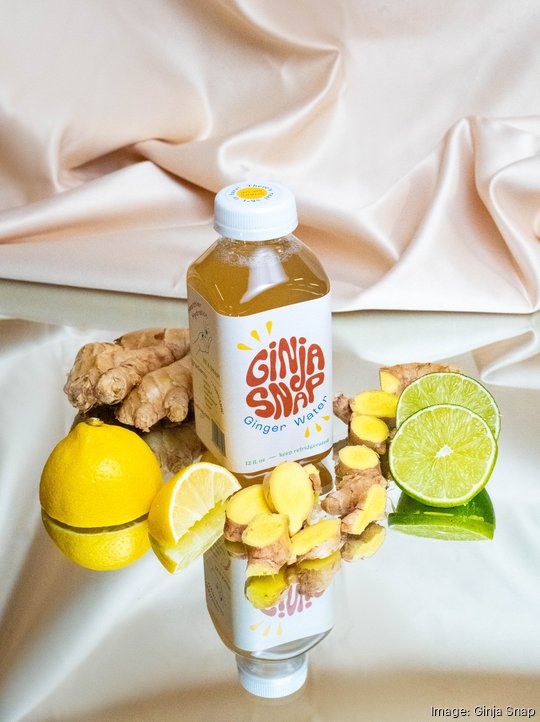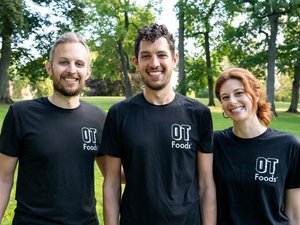
A Philadelphia ginger beverage company has been selected for the latest cohort of Santander’s small business program, a move the founder hopes will aid her goal of raising funds and eventually scaling to larger regional retailers.
Shaakira DeLoatch formed Ginja Snap in October 2020 and spent the subsequent year refining the business model and formally launching in the market in September 2021. She took the business on full-time early this year and through August has seen business double compared with the same period the year prior and projects by the end of 2023 business will have at least tripled.
Much of that has come as a result of her recent move to a commercial kitchen space in July at the Old Pine Community Center in Society Hill. The move has allowed her to gain her first retailers: Salt and Vinegar, Lombard Café, Honeysuckle Provisions and Three Queens Yoga, all in Philadelphia.
As she looks ahead, DeLoatch’s goal is to grow to more regional retailers like Riverwards Produce and Herman’s Coffee and would like to break into other wellness-focused regions such as California, Colorado, New York and Miami.
DeLoatch has positioned the beverage as part of the health and wellness industry, likening the ginger water to a healthier alternative to ginger beer or ginger ale, but less sweet. It can be consumed as is, heated like a tea, or added to other drinks like mocktails, cocktails or smoothies.
A 12-ounce bottle sells for $6 and has 70 calories, 20 grams of carbohydrates and 13 grams of sugar.

The brewed beverage is made with water, ginger, raw honey, lemons and limes. “It's very light and refreshing and the spice is there but it's not overpowering and it's not too sweet,” DeLoatch said. It can be consumed simply as a drink but may also be beneficial for morning or motion sickness, a sore throat, muscle soreness and certain other aches.
A sore throat is how DeLoatch came to the idea in the first place. In 2016, while a student at the University of Maryland, DeLoatch had a sore throat and a friend recommended brewing water and ginger to help soothe it. She did, but as it was boiling she became distracted and stepped away. When she returned to check on the pot, most of the water had evaporated, leaving a highly concentrated ginger concoction, which she drank.
“Within 30 minutes, I noticed a difference in my throat,” DeLoatch said. “From that point on, I just swore by ginger. Every time I was sick, I would make a brew.”
She even began making it part of her daily routine.
Several years later, when the Covid-19 pandemic swept the globe, she decided to revisit something in the wellness space. While ginger isn’t a cure for anything, it contains antioxidants that help fight free radicals. It can also reduce bloating and provide nausea relief, according to a report from Johns Hopkins Medicine.
A Monmouth County, New Jersey, native, during the pandemic DeLoatch relocated to Philadelphia, closer to where she grew up – she graduated from Pennsbury High School in Fairless Hills – and began the business. It also put her near her brother who owns vintage apparel store Search + Rescue Drygoods in Brewerytown. It was there she first began testing out recipes, which she has since refined.
DeLoatch, 29, currently hand produces and packs Ginja Snap from the kitchen at Old Pine Community Center. She estimates she can produce up to 150 bottles in a sitting but would like to increase both capacity and shelf life. A bottle of Ginja Snap currently is good for two weeks, but she’d eventually like for it to be three months. Increasing shelf life would allow her to increase distribution and inventory at retailers, she said.
To increase shelf life by way of natural preservatives, DeLoatch is looking to work with the Drexel Food Lab. She is currently trying to secure between $5,000 and $10,000 to help her do so by the end of the year. Her goal is to raise funds through grants or pitch competitions, having self-funded the business thus far.
This month, she began in the latest local cohort of the Santander US Cultivate Small Business Program held at Temple University. The program, now in its seventh year, runs two cohorts in a handful of cities annually for food businesses owned by women, immigrants or those identifying as Black, indigenous, or people of color. Participating businesses also must have been in operation for at least a year and have revenue between $25,000 and $1 million in the previous calendar year.
The 12-week program provides “food-focused curriculum, mentorship, coaching, and small capital grants,” according to its website. Though DeLoatch doesn’t know what a grant might look like, she’s hopeful those funds will help get her work with the Drexel Food Lab.
Once shelf life has been extended, she plans to sign with a co-packer as early as next year. That would allow her to increase wholesale business, which presently accounts for about 40% of sales, with the remaining 60% coming from events and pop-ups. While a big part of business – she sells at Dickson Square Farmers’ Market, Germantown Farmers Market and will participate in the Free From Fest at Old Pine Community Center next month – her goal is for wholesale to drive business.
In time, DeLoatch also foresees adding additional drink flavors or products offerings.







